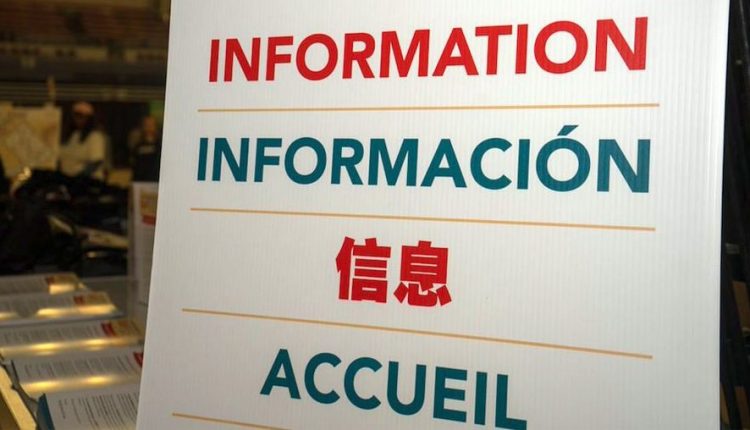
Language access bill poised to help DC schoolchildren and families
A new bill approved last week by the DC Council could add heft to the city’s language access services, easing life for schoolchildren and parents who speak little to no English.
The Language Access for Education Amendment Act, introduced in January 2017, updates the city’s original language-access legislation from 2004, which required government agencies and programs to provide services in different languages. The 2004 law also set out additional responsibilities that apply to about three dozen agencies “with major public contact.”
This year’s expansion will mandate creation of a new training video for DC agencies and a central repository for translated documents as well as heighten requirements for DC public and charter schools if it is signed by the mayor and passes congressional review. The bill passed unanimously at the council’s Nov. 13 and Dec. 4 meetings, with a last-minute amendment making the council itself subject to some of the bill’s requirements. The bill’s applicability is subject to appropriations in a future budget, with the city’s chief financial officer projecting that implementation would cost $35 million in the first four years.

Critics have said enforcement has been spotty on the original 2004 legislation, which directed relevant agencies to offer oral interpretation services, identify a language access coordinator, and implement a language access plan. It also required offering written translation of important documents when it’s determined that the agency serves a sufficient number of non-proficient English speakers.
The DC Office of Human Rights, which oversees enforcement and would gain added responsibilities under the expanded law, has identified six main languages used by people contacting the District government: Korean, Chinese, Vietnamese, French, Spanish and Amharic.
The new legislation focuses primarily on public and charter schools, adding new layers to existing local and federal protections for English learners. It amends the 2004 law to specify charter schools as covered entities subject to extra requirements, a classification that already applied to the DC Public Schools system.
Under the bill, the schools will have to provide translations of any essential information to children, parents and guardians, though the Public Charter School Board says its schools already do so. Each school will also have to choose a language-access liaison or, in schools with a large population of non-English speakers, hire at least one specific coordinator.
Advocates for the law have emphasized the need for these services given the diverse population in DC, which is currently home to 95,000 foreign-born residents. Some also fear that the current White House could roll back existing federal regulations.
“We need local protection for local immigrant communities because we can’t totally rely on some of the federal guidance and federal laws and protections that are typically there,” Sapna Pandya, director of Many Languages One Voice, a local immigrant justice organization, said at an April 2017 hearing.
“Not providing language services is tantamount to discriminating against an entire community of individuals,” she added.
Hannah Groff, a language-access coordinator for Center City Public Charter Schools, testified at the hearing that the creation of her position in 2016 had made a significant difference in the lives of students and parents. “It has given parents, families,and students the opportunity to consistently focus on the content of their education, not the struggle to understand or communicate around it,” she said.

Brian Pick, chief of teaching and learning at DC Public Schools, expressed doubt that schools could afford the added expense. “While federal Title VI already requires school districts to provide information to parents when necessary in their required language, we have overall concerns about the schools’ capacity to translate and pay for the broad range of documents identified,” he said at the hearing.
The bill initially generated some controversy for the inclusion of fines for non-compliance — a provision that was removed in October when the Committee of the Whole marked up the bill. The proposal called for using half of the fine to compensate families who reported lack of language access.
Proponents believed the fines would incentivize agencies and schools to comply, adding teeth to the 2004 legislation that many continue to ignore.
In 2015, the Washington Lawyers Committee filed a class-action lawsuit on behalf of limited-English individuals who were denied access to benefits by the DC Department of Human Services. The complaint noted that the department had been rated 0 out of 5 in language-access compliance by the Office of Human Rights in 2014, a decade after the passage of the original Language Access Act.
The Legal Aid Society has specifically called out the DC Housing Authority for noncompliance, saying that clients have had agency employees hang up on their calls when making requests in Spanish.
“Agencies have little to no incentive to comply with the law, and those who suffer violations have little to no incentive to file complaints in the first place,” the organization wrote in written testimony to the council.
Critics of the fines argued that adding financial burdens to schools would be counterproductive. Monica Palacio, director of the DC Office of Human Rights, also noted that monetary fines awarded to complainants typically result in a high number of complaints filed — more than the office can take on, she said.
“We believe gaps in compliance could be best addressed by increasing the capacity of agencies to better meet the needs of [low-English proficient] customers,” Palacio said.
The new law passed its first council vote in November with vocal support from Council Chairman Phil Mendelson and from members David Grosso and Charles Allen, two of the seven legislators who originally introduced the bill. There was little discussion during the final vote beyond Mendelson’s introduction of his amendment regarding the law’s applicability to the council.
In remarks before the November vote that he shared in a series of tweets, Grosso highlighted the growth in DC’s immigrant population since adoption of the 2004 law and noted that improved services for students whose first language is not English could help address disparities in achievement within and among schools. He said he was pleased to see the bill move forward after working on the issue for several years.
“Schools have a fundamental mandate to teach and serve every child no matter the cost,” Grosso told his colleagues. “This means ensuring that students and their families who do not speak English have access to essential information in as timely a manner as others.”


Comments are closed.